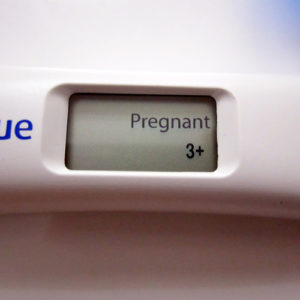Negative pregnancy tests can be heartbreaking if you have been trying to conceive. However, it is possible that your pregnancy test is wrong. There are times that negatives are actually positive results and we’ll cover these shortly.
To decrease the risk of a false negative test, you should wait until your period is due – preferably afterwards – before taking any pregnancy test. You will ensure that there is a detectable amount of human Chorionic Gonadotropin (hCG) hormone so that the pregnancy tests can determine that positive result you’ve waited to see.
Why False Negatives Tests Happen
False negative pregnancy test results sometimes occur when you are really pregnant. There are a number of reasons why the negative may happen:
You’ve Tested Too Early
You may have calculated your ovulation cycle wrong or the egg may have implanted at a later date. By taking a test before your period is meant to happen, you are likely to get a negative result. The levels of the hCG hormone hasn’t had the chance it needs to build up and it will not be detectable for the pregnancy test.
It is also worth finding out more about the sensitivity of the test you are using. Those with 25 mIU will be able to test four to five days before the due date of your period. Those with higher sensitivity levels will not usually detect the hCG until a day or two later. Avoid risking testing too early by waiting until after your period is due. Those that are extremely sensitive will be able to pick up the positive result.
You’ve Diluted Your Urine Sample
When taking a pregnancy test, it is important to provide an undiluted urine sample. Drinking too much water or other fluids before the test can cause the urine to become too diluted, which can lead to a false negative result. This is because the hCG hormone levels may be too low to detect in a diluted sample. It’s recommended that you wait a few hours after drinking fluids before taking a pregnancy test to ensure your urine is not too diluted.
You Haven’t Used the Pregnancy Test Properly
You need to follow the directions on the test to the letter. You have the option of urinating directly on the strip or dipping it into a cup of urine. The first part of the stream and the first urine of the day have the most concentrated levels of hCG and will make it easier for the test to pick them up. Not following the instructions could lead to false negatives appearing. Most pregnancy tests come with well illustrated instructions which should reduce the chance of mistakes. If your test is manufactured by one of the big brands such as Clearblue or First Response, you can also find video instructions on YouTube.
Not Following the Right Time Frame
The tests have a stipulated timeframe for when to look to see if you are pregnant. You should check when that timeframe has passed – any earlier and you will not have given it enough time to detect the hormones and any later and the test becomes invalid and can lead to negative results.
If you have a negative result but think there is a chance that it could be wrong, give it a couple of days and then take another test. Negative results don’t necessarily mean that you are not pregnancy. It may be that you took the test when there wasn’t enough hCG hormone in your body or it could be that you took the test incorrectly.
If you take multiple tests and receive different results, contact your doctor and have a blood test taken. This will help to make sure you get the accurate result.
The Pregnancy Test Is Faulty
Let’s be realistic here – it is very rare for a Pregnancy Test to be faulty. Most are produced to very strict manufacturing guidelines so the chances of the test not working correctly are very rare indeed. It does happen very occasionally though – in October 2018, for example, Clear & Simple had to recall thousands of faulty pregnancy tests. This was due to the fact that the tests were incorrectly telling ladies that they were pregnant, when actually they were not.
If you are every in doubt, always use reliable pregnancy tests such as those sold here at Zoom Baby.
I Missed My Period but My Pregnancy Test Is Negative, What’s Going On?
When you miss your period it is easy to jump to the simple conclusion that you might be pregnant. However, this may not always be the case. For starters, your menstrual cycle can vary between cycle. Statistics show that a 7 day difference between cycles is common for nearly half of women. Another reason you might no have a period can be because of:
- high levels of stress
- poor sleep
- travel
- illness
Furthermore, weight fluctuations, hormonal changes, and certain medications can also affect your menstrual cycle. All of these factors can lead to a delayed or missed period, even if you’re not pregnant. If you have just had a baby and are breastfeeding, this can also cause irregular periods. Things might not get back to normal until you stop feeding.
The onset of menopause is another possible reason for the lack of a period. Similarly, birth control pills can also change the frequency of your periods when you first come off them. The reason for this is because, whilst you are taking hormonal contraceptives, they take control of your menstrual cycles so it is possible for you to be irregular for a month or two as your body ‘recalibrates’.
If you haven’t had a period for months, see your GP to find out the reason. It could be down to an imbalance in levels of your hormone, a side effect from medication, too much exercise, or being severely under or overweight.
In some cases, however, a negative pregnancy test could also indicate an ectopic pregnancy, which is when a fertilised egg implants itself outside of the uterus. This can be a dangerous situation and requires immediate medical attention. Other symptoms of an ectopic pregnancy include abdominal pain, vaginal bleeding, and dizziness.
If you are experiencing any unusual symptoms along with the missed period, it is important to see a healthcare provider for further evaluation. They may perform additional tests or provide additional guidance on how to regulate your menstrual cycle. Remember, a missed period does not always mean you are pregnant, but it is always worth checking in with your healthcare provider to ensure your overall health and well-being.
Emotional Impact of False Negative Results
Receiving a negative pregnancy test result when you are actively trying to conceive can be extremely disappointing and upsetting. The emotional impact should not be underestimated. For many couples, starting a family is one of the most meaningful experiences in life. When pregnancy tests continually show negative results, it can lead to significant stress, anxiety, sadness, and even depression in some cases.
It is important for couples to support each other emotionally during this difficult time. Seeking professional counseling or joining a support group for others dealing with infertility issues can also help manage the emotional toll. Practicing self-care, staying connected with loved ones, and trying to maintain a positive attitude are also beneficial. With time and the right support, the initial grief of negative pregnancy tests can lessen.
Troubleshooting Negative Pregnancy Test Results
Even after following all the instructions, you may still find yourself staring at a negative pregnancy test in confusion. Don’t panic just yet! There are a few troubleshooting steps you can take.
First, double-check the test instructions and make sure you performed the test correctly. Little mistakes like checking the results too early or too late can lead to inaccurate negatives. It’s an easy oversight to make when you’re anxious for results.
If you did everything right, consider taking another test in a couple days with your first morning urine. That sample will have more concentrated hCG levels for better detection. Stick to pink dye tests over blue dye ones, as pink tests tend to be more sensitive to low hCG.
While rare, a defective pregnancy test is possible. If you have stark negatives despite repeated testing with first morning urine after a missed period, contact your doctor. A serum blood test can detect even tiny amounts of hCG that urine tests may miss.
Understanding hCG Levels in Early Pregnancy
Human chorionic gonadotropin (hCG) is the pivotal hormone that home pregnancy tests detect. However, its levels can vary significantly in very early pregnancy stages.
Typically, hCG starts building up around 6 days after successful implantation. Levels then double roughly every 2-3 days. Yet this doubling rate isn’t always consistent, especially if the embryo is developing more slowly.
At 3-4 weeks since your last period, normal hCG values range from 5 to 426 mIU/mL. This wide range illustrates why some tests detect the pregnancy earlier than others based on their sensitivity cutoff.
By 5-6 weeks pregnant, hCG levels zoom up further to 18-7,400 mIU/mL. Once they surpass 25 mIU/mL, most standard pregnancy tests today can register the positive result clearly.
When to See a Doctor About Negative Tests
If you miss your period and continue getting negative tests over a week later, make an appointment with your OB/GYN. There may be an underlying cause for your missed cycle like:
- Hormonal imbalances
- Thyroid disorder
- Excessive exercise
- Significant weight loss
- Extreme stress
Your doctor can do a transvaginal ultrasound to check for any early pregnancy signs. If no pregnancy is detected, they can investigate and treat any potential issues delaying your period.
Persistent negatives in spite of trying for many months may sadly indicate infertility struggles. However, don’t lose hope – your doctor can run more extensive fertility testing for both you and your partner. Discussing treatment options like medications or assisted reproductive technology can help get your pregnancy journey back on track.
Accuracy of Home Pregnancy Tests
When used properly, today’s home pregnancy tests are very accurate, with false negatives being quite uncommon if timed correctly. Sensitivity levels vary between different test brands, but many can detect hCG between 5-25 mIU/mL. For optimal accuracy, read test results within the specified time frame and do not take expired tests.
However, no test is 100% perfect. The chance of false negative is highest when testing very early, with dilute urine, or not following instructions properly. If uncertain, retest with first morning urine a few days later when hCG levels have risen further. Discuss any ongoing concerns about inaccurate test results with your healthcare provider.
Photo by Zoom Baby
Zoom Baby is a leading supplier of Pregnancy Tests and Ovulation Test Kits





